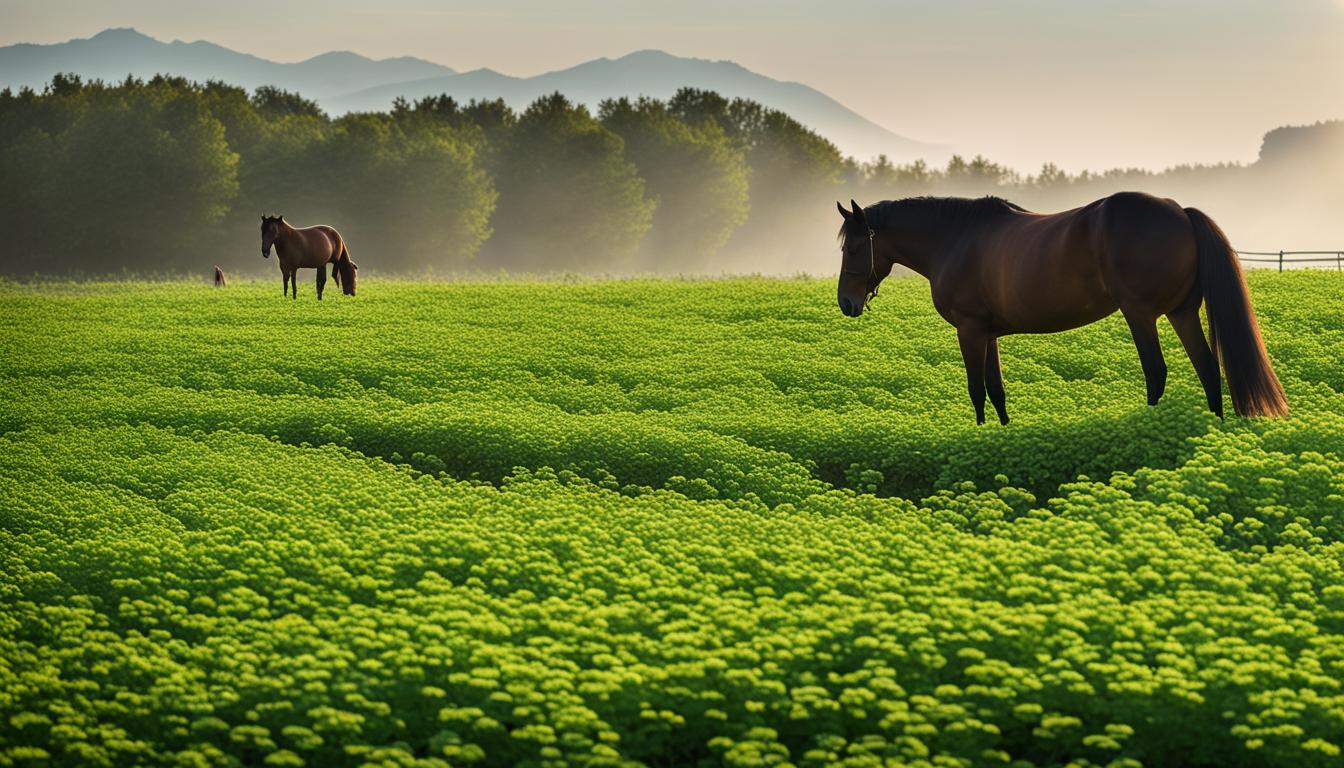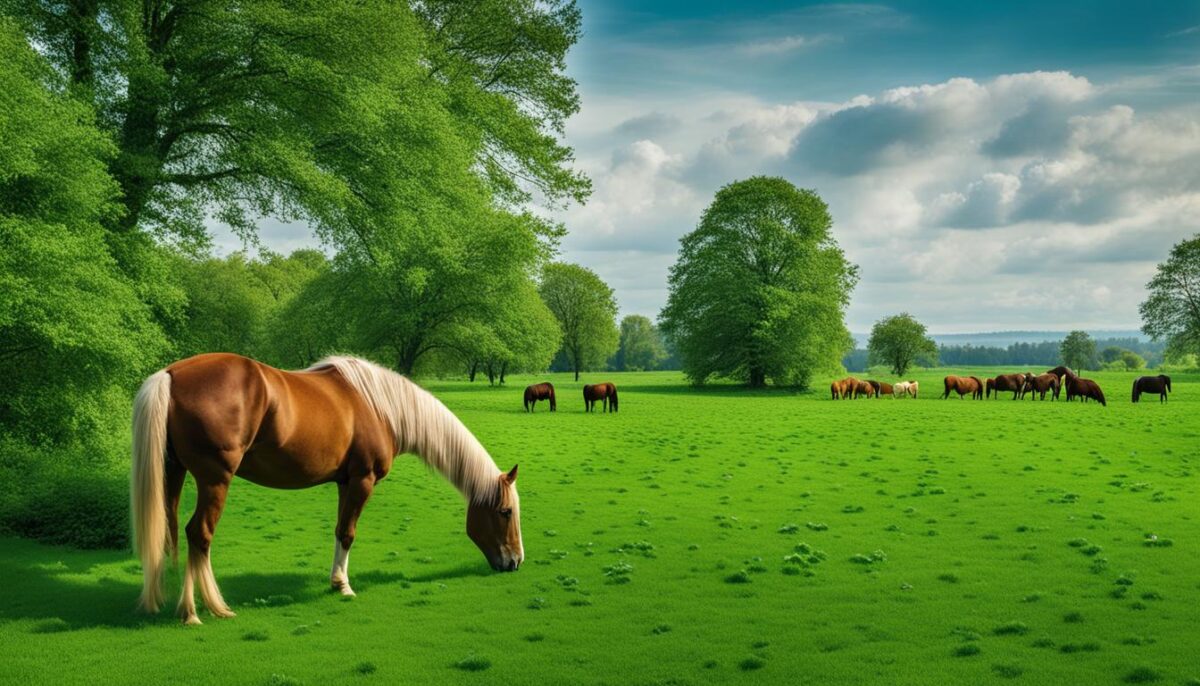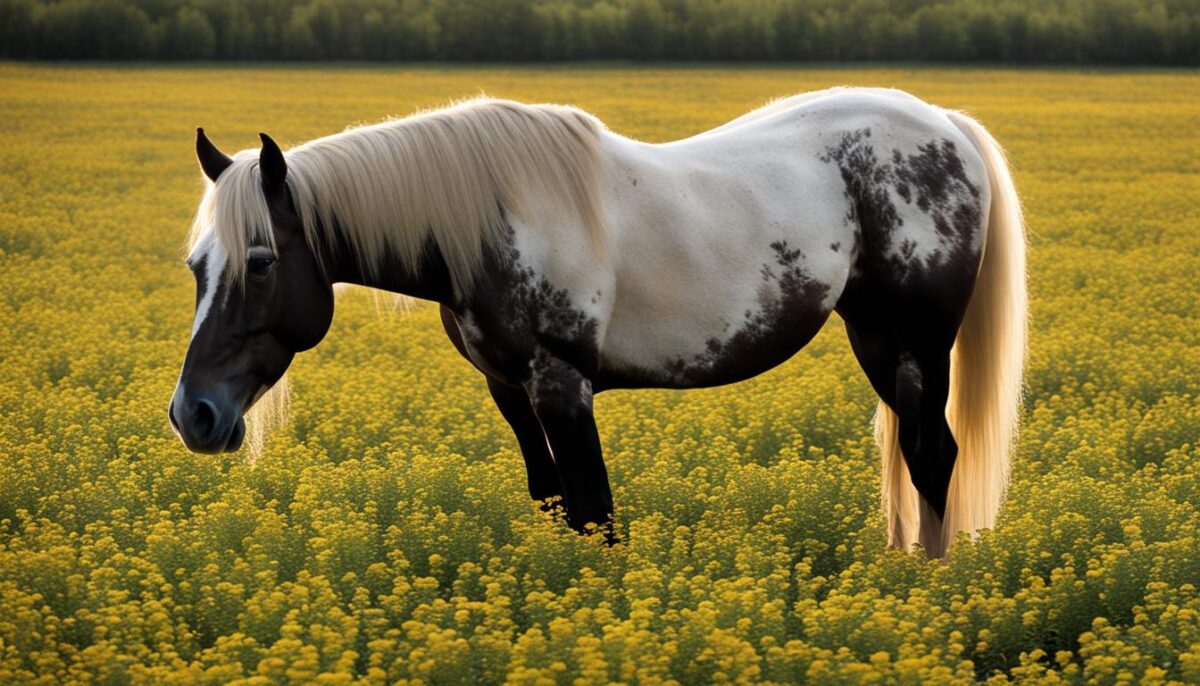When you look out at a field of horses, you might see them nibbling on lots of plants. One of these plants could be clover. Clover comes in several types, like red, white, and sweet clover. Each type has different bits that can be good or not so good for horses. So, can horses eat clover? Yes, but there’s more to know.
Clover is often part of a horse’s diet and clover consumption can offer them many health perks. Horses usually like the taste of red and white clover, and these are packed with goodies that keep them strong and healthy. But, if clover gets sick with a fungus called “black patch,” it can make a horse’s mouth very wet and they drool a lot. This looks funny, but it’s not bad for the horse. However, a kind called alsike clover can be harmful and make horses really sick, especially if they eat it a lot. And sweet clover? It’s mostly okay, unless it goes bad and gets moldy – that can be dangerous for horses. It’s important to pick safe plants for horse grazing.
If you take care of horses, learning about clover is a smart way to keep them fed right. Making sure horses eat safe types of clover is a big part of equine nutrition and care. Now, let’s look at some key things to remember about clover and horses.
Key Takeaways
- Red, white, and sweet clover can be part of a horse’s diet, but some kinds need a careful look.
- “Black patch” fungus can make horses drool, but it’s not harmful.
- Alsike clover can hurt your horse, especially with too much sun or eating too much of it.
- Bad, old, moldy sweet clover can make horses sick — keep it fresh and dry.
- Knowing about clover helps keep your horses eating yummy, safe foods.
Understanding the Nutritional Benefits of Clover for Horses
Hey there! You might be wondering why clover is a good snack for your horse. Well, clover is like a powerhouse of nutrients. It’s full of all the good things that horses need to stay healthy and happy. It’s kind of like their version of a superhero food. Let’s dig in and see why.
Protein Content and Muscle Health
First off, clover is jam-packed with protein. This is super important for your horse’s muscles. When horses run around or do heavy work, they need protein to help their muscles grow and fix any damage. Red and white clover are especially high in protein, which makes them great for keeping your horse in tip-top shape.
Fiber-Rich Clover and Digestive Wellness
Next up is fiber. Just like you, horses need fiber to keep their digestive system running smoothly. Fiber helps all the food they eat move through their tummy without any trouble. And you guessed it, clover is full of fiber, which means fewer tummy troubles for your horse.
The Significance of Essential Vitamins and Minerals
Clover isn’t just about protein and fiber. It’s also got lots of vitamins and minerals. These are like little helpers that make sure everything in your horse’s body is working right. With clover in their diet, horses can have strong bones, good eyesight, and fight off germs better, thanks to things like Vitamin A, Vitamin C, calcium, and phosphorus.
Clover’s Role in Pasture Ecology and Soil Fertility
Did you know that clover is good for the land too? It helps make the soil rich and healthy. When clover grows, it can actually add a special thing called nitrogen to the soil. This helps other plants grow better, which means even more yummy stuff for horses to munch on. Neat, huh?
Now, while clover is a fantastic choice for your horses, we need to remember that not all clovers are created equal. Some types can cause problems if they’re not healthy or if your horse eats too much of them. So, always keep an eye out and make sure the clover in your pasture is the good kind!
So there you have it – clover is a horse’s snack that’s loaded with good stuff, and it’s also a friend to the field it grows in. Keep this in mind when you’re thinking about what’s best for your horse’s health and their home. Clover forage is really a hero for horse health and the equine digestive system, but be careful with clover digestion, because there are risks of feeding clover to horses if it’s not the right kind or if it gets sick with a fungus.
Can Horses Eat Clover: Distinguishing the Safe Varieties
If you have horses, you’re probably wondering what kind of clover they can eat. The good news is that horses can munch on clover varieties for horse pastures, like red and white clover, without trouble most times. Red and white clover are safe plants for horse grazing and can be yummy and healthy for horses. But, you have to watch out for some others, like alsike clover, because it can cause big problems. Alsike clover can hurt horses’ skin in the sunshine and damage their liver. Sweet clover is okay too, but it has to stay fresh. If it gets moldy, it’s no good and can make your horse sick.
It’s really important to keep your horse’s field clean and full of the right kind of clover. This helps to keep your horse happy and safe. So, knowing about clover toxicity in horses is key. Knowing your clovers can help you take good care of your horse.
Here is a table to help you know the good from the not-so-good:
| Type of Clover | Is it safe for horses? | What to watch out for |
|---|---|---|
| Red Clover | Yes | Make sure it does not have black patch fungus. |
| White Clover | Yes | Check for black patch fungus, too. |
| Alsike Clover | No | Can hurt horse’s skin and liver. |
| Sweet Clover | Mostly Yes | Keep it from getting moldy to be safe. |
Remember, when it comes to clover, choosing the right types and making sure they are healthy is super important for keeping your horse feeling great. You want to go for clover that brings lots of smiles and no ouches. Not all clovers are the same, and now you’ll be able to tell which ones are the best for your horse friends.
Recognizing and Responding to Clover Toxicity in Horses
Hey friends! Ever see a horse with a mouth full of drool? It might be because of a sneaky fungus on red or white clover. This little critter is called “black patch” and while it’s not super bad, it does make horses drooly. But watch out for alsike clover, it has a dark side that could hurt your horse. Sweet clover? It’s usually cool unless it gets moldy—then it can cause some serious trouble. Let’s learn how to keep those horses safe and healthy!
Identifying Harmful Fungi in Clovers
If you find your horse drooling buckets, it could mean there’s “black patch” fungus in the clover. Keep your eyes peeled for dark spots on clover stems and leaves. That’s the tricky fungus! It’s not gonna hurt your horse a lot, but you don’t want them too slobbery. Good news is that you can clear out this fungus and make your pastures a safe place for horse grazing.
Alsike Clover and the Risks of Liver Damage
Alsike clover is the one to watch out for. It’s got a pretty pink flower but don’t let it fool you. It can give horses a big-time sunburn and even mess with their liver if they eat too much. Big liver problems are no joke and we want horses feeling good. If you see signs like your horse feels sad, turns yellow like a banana, or doesn’t want to eat, call the vet pronto!
The Dangers of Moldy Sweet Clover
Sweet clover is kinda like candy to horses, but if it gets moldy, uh-oh. That’s when it can make horses bleed inside, and that’s mega-serious stuff. A simple way to stop this scary thing from happening is to keep sweet clover clean and dry. Think about it like making sure your snacks don’t get gross, so you stay happy and healthy.
Caring for horses means being a detective sometimes. You have to hunt for these sneaky fungi and bad clovers. Remember, understanding equine nutrition and clover is important. By knowing about clover forage and horse health, you can prevent clover toxicity in horses and pick safe plants for horse grazing. Keep those pastures clean and full of good snacks for our four-legged buddies!
Clover and Equine Health: When Slobbering Isn’t Just Drooling
Have you ever seen a horse looking like they are blowing bubbles with their spit? It might make you laugh, but it could be a sign that they’re eating certain kinds of clover in their pasture. Clover can be part of a horse’s diet, and horses like to eat it. Sometimes though, a thing called fungus can grow on it and make a horse’s mouth extra slobbery.
Red and white clovers are usually safe for horses. If they get sick with the “black patch” fungus, it can make horses drool a lot. It looks funny, but it’s not dangerous. As for alsike clover, it’s a bit trickier. It looks pretty with its pink flowers, but too much drooling from it can mean something serious. If you see sores in the horse’s mouth, a bad tummy, or if they seem sad, it’s time to check what they’ve been munching on. Horse diet and clover consumption need to be watched to avoid clover toxicity in horses and keep them healthy and happy.
So, can horses eat clover? Yes, they can, but like all snacks, it’s best to nibble in moderation and make sure it’s the good stuff. No one wants their four-legged pals to feel yucky. It’s important for us to know what’s in our horse’s diet and to steer clear of the risks of feeding clover to horses that’s not just right for them. Let’s take good care of our horse buddies by keeping their meals safe!
FAQ
Can horses eat clover?
Yes, horses can eat clover. Both red and white clover are common parts of a horse’s diet and can provide nutritional benefits. However, it’s essential to ensure that the clover is free of molds and fungi for safe consumption.
What are the nutritional benefits of clover for horses?
Clover is packed with protein, which supports muscle health, and fiber for digestive wellness. It also provides essential vitamins and minerals, such as Vitamin A, Vitamin C, calcium, and phosphorus, which play various roles in equine health, including immune function and bone strength.
What kind of clover is safe for horse grazing?
Red and white clovers are typically safe and beneficial for horse grazing. It’s important to keep an eye out for alsike clover, as it can cause liver damage and skin issues, and to ensure that sweet clover has not become moldy, which can be toxic.
How does clover affect the digestive system of horses?
The fiber content in clover is excellent for the equine digestive system, facilitating a smooth digestion process. However, horse owners should monitor for signs of clover toxicity or adverse reactions, which can include issues like excessive drooling or digestive upsets.
What are the risks of feeding clover to horses?
While clover can be a healthy addition to a horse’s diet, there are risks associated with certain types or conditions of clover. Alsike clover can cause liver damage and photosensitization, and moldy sweet clover can lead to bleeding disorders. Red and white clover infected with the “black patch” fungus can cause slobbering, but it’s not harmful in the long run.
What’s the role of clover in pasture ecology?
Clover plays a significant role in pasture ecology by improving soil fertility. Its roots fix nitrogen in the soil, which helps other plants grow and can enhance the overall quality of the grazing area for horses, making it a sustainable choice for pasture management.
How can I identify harmful fungi in clovers?
Harmful fungi in clovers can be identified by looking for symptoms such as the “black patch” which appears as dark spots on clover leaves. If horses produce excessive saliva or exhibit signs of intoxication, this could indicate the presence of fungi, and the clover should be removed from their diet.
What are the effects of alsike clover on horses?
Alsike clover can cause two main types of toxicity in horses: photosensitivity, leading to skin lesions in sun-exposed areas, and liver damage, which could result in jaundice and other serious health issues if consumed over a long period.
What should I do if my horse consumed moldy sweet clover?
If you suspect your horse has consumed moldy sweet clover, it’s crucial to seek veterinary attention immediately. Moldy sweet clover can cause a bleeding disorder due to a toxic substance produced when the clover spoils.
Why is my horse slobbering excessively, and what should I do?
Excessive slobbering in horses can be caused by a fungus on red and white clover, often referred to as “black patch.” While this condition isn’t typically dangerous, if it’s accompanied by other symptoms like skin sores or lethargy, it could be due to more harmful types of clovers like alsike clover. In such cases, removing the suspected clover from the horse’s diet and consulting a veterinarian is advisable.


